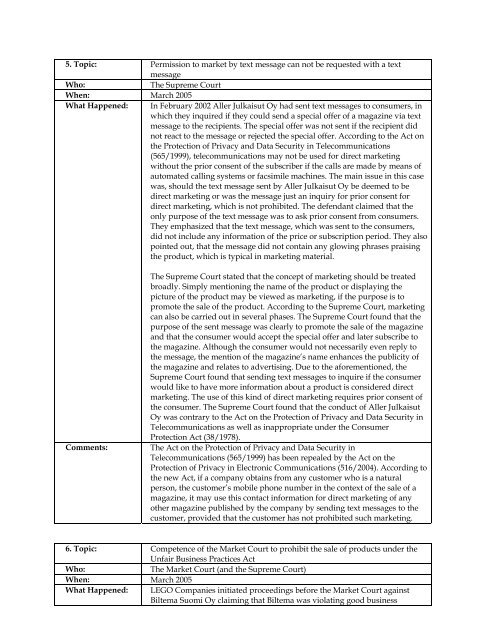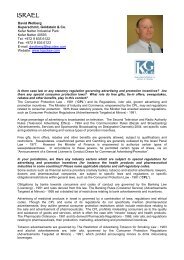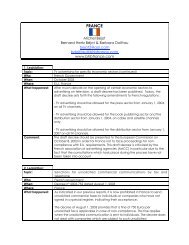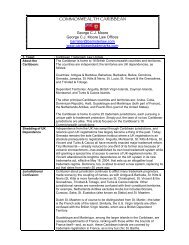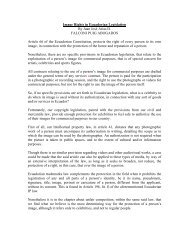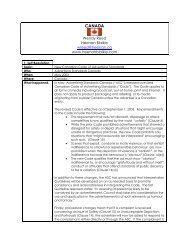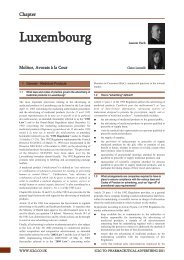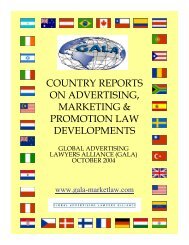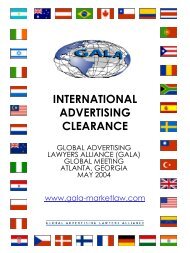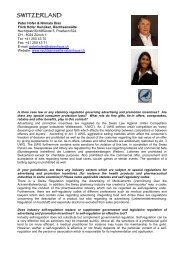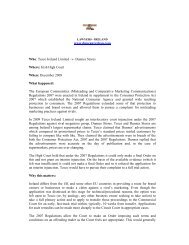list of contributors - GALA
list of contributors - GALA
list of contributors - GALA
Create successful ePaper yourself
Turn your PDF publications into a flip-book with our unique Google optimized e-Paper software.
5. Topic: Permission to market by text message can not be requested with a text<br />
message<br />
Who: The Supreme Court<br />
When: March 2005<br />
What Happened: In February 2002 Aller Julkaisut Oy had sent text messages to consumers, in<br />
which they inquired if they could send a special <strong>of</strong>fer <strong>of</strong> a magazine via text<br />
message to the recipients. The special <strong>of</strong>fer was not sent if the recipient did<br />
not react to the message or rejected the special <strong>of</strong>fer. According to the Act on<br />
the Protection <strong>of</strong> Privacy and Data Security in Telecommunications<br />
(565/1999), telecommunications may not be used for direct marketing<br />
without the prior consent <strong>of</strong> the subscriber if the calls are made by means <strong>of</strong><br />
automated calling systems or facsimile machines. The main issue in this case<br />
was, should the text message sent by Aller Julkaisut Oy be deemed to be<br />
direct marketing or was the message just an inquiry for prior consent for<br />
direct marketing, which is not prohibited. The defendant claimed that the<br />
only purpose <strong>of</strong> the text message was to ask prior consent from consumers.<br />
They emphasized that the text message, which was sent to the consumers,<br />
did not include any information <strong>of</strong> the price or subscription period. They also<br />
pointed out, that the message did not contain any glowing phrases praising<br />
the product, which is typical in marketing material.<br />
The Supreme Court stated that the concept <strong>of</strong> marketing should be treated<br />
broadly. Simply mentioning the name <strong>of</strong> the product or displaying the<br />
picture <strong>of</strong> the product may be viewed as marketing, if the purpose is to<br />
promote the sale <strong>of</strong> the product. According to the Supreme Court, marketing<br />
can also be carried out in several phases. The Supreme Court found that the<br />
purpose <strong>of</strong> the sent message was clearly to promote the sale <strong>of</strong> the magazine<br />
and that the consumer would accept the special <strong>of</strong>fer and later subscribe to<br />
the magazine. Although the consumer would not necessarily even reply to<br />
the message, the mention <strong>of</strong> the magazine’s name enhances the publicity <strong>of</strong><br />
the magazine and relates to advertising. Due to the aforementioned, the<br />
Supreme Court found that sending text messages to inquire if the consumer<br />
would like to have more information about a product is considered direct<br />
marketing. The use <strong>of</strong> this kind <strong>of</strong> direct marketing requires prior consent <strong>of</strong><br />
the consumer. The Supreme Court found that the conduct <strong>of</strong> Aller Julkaisut<br />
Oy was contrary to the Act on the Protection <strong>of</strong> Privacy and Data Security in<br />
Telecommunications as well as inappropriate under the Consumer<br />
Protection Act (38/1978).<br />
Comments: The Act on the Protection <strong>of</strong> Privacy and Data Security in<br />
Telecommunications (565/1999) has been repealed by the Act on the<br />
Protection <strong>of</strong> Privacy in Electronic Communications (516/2004). According to<br />
the new Act, if a company obtains from any customer who is a natural<br />
person, the customer’s mobile phone number in the context <strong>of</strong> the sale <strong>of</strong> a<br />
magazine, it may use this contact information for direct marketing <strong>of</strong> any<br />
other magazine published by the company by sending text messages to the<br />
customer, provided that the customer has not prohibited such marketing.<br />
6. Topic: Competence <strong>of</strong> the Market Court to prohibit the sale <strong>of</strong> products under the<br />
Unfair Business Practices Act<br />
Who: The Market Court (and the Supreme Court)<br />
When: March 2005<br />
What Happened: LEGO Companies initiated proceedings before the Market Court against<br />
Biltema Suomi Oy claiming that Biltema was violating good business


